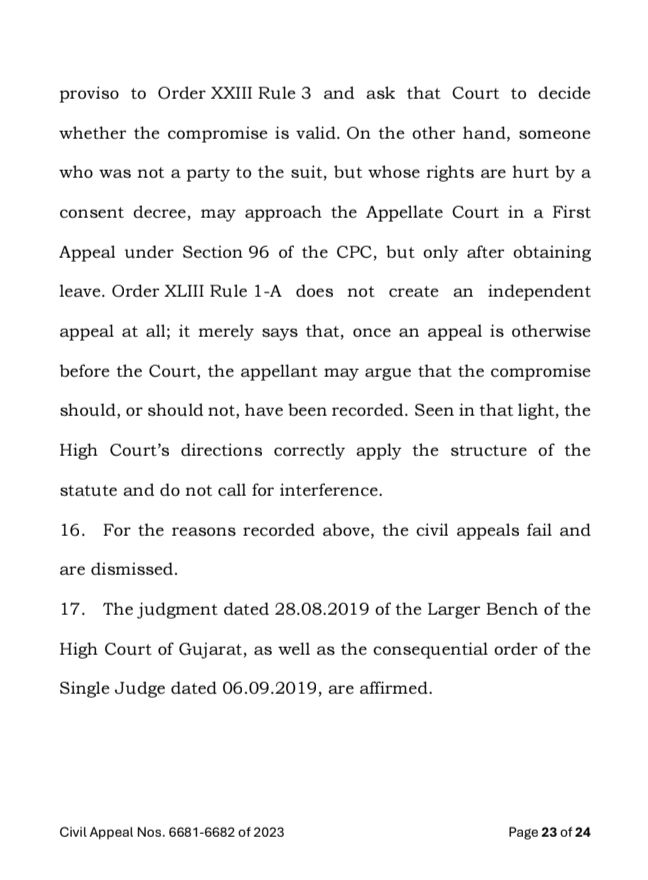When Consent Decrees Collide with Fraud Allegations: Navigating the Two-Stage Gateway
- M.R Mishra

- Apr 28, 2025
- 4 min read
The saga of Sakina Sultanali Sunesara v. Shia Imami Ismaili Momin Jamat unfolds as a cautionary tale of consent decrees and the razor-thrust of procedural bars. At its heart lies the appellant’s contention that two purported compromises, recorded under Order XXIII Rule 3 CPC on 15 March and 17 December 2016, were never her own and were secured by fraud.
Rather than invoking the Trial Court’s exclusive jurisdiction under the proviso to Rule 3, she sought to leapfrog directly into a First Appeal under Section 96(1) CPC.
The Supreme Court’s recent affirmance of the Gujarat High Court’s Larger Bench, however, underlines that the 1976 amendments to the CPC deliberately channel any challenge to the very existence or validity of a compromise through a two-stage, sequential gateway: first the Trial Court, then if necessary the Appellate Court .
The factual matrix is labyrinthine but telling.
Three contiguous plots in Siddhpur passed by inheritance and power of attorney to multiple co-owners, culminating in an agreement in 2007 to sell nearly 29,000 sq. m. for ₹2.51 crore. Only ₹15 lakh changed hands before the transaction was purportedly terminated in 2011. In 2013, eight vendees executed a cancellation deed and indemnity bond, even as the appellant accrued sole title through successive mutation entries.
By mid-2015 she had sold roughly 16,000 sq. m. to third-party purchasers, triggering a revival of the sale claim by those claiming under the original agreement .
What followed was a thicket of litigation: a declaration suit, cross-applications for specific performance, and two successive written compromises recorded as consent decrees.
The appellant maintains she never authorised counsel to settle on her behalf and that both decrees were procured surreptitiously, prompting two Applications under Order XLIII Rule 1-A to set aside the decrees on grounds of fraud and want of authority.
Rather than first testing the validity of the compromises in the Trial Court, she endeavoured to invoke a direct First Appeal under Section 96(1), contending that the deletion of Order XLIII Rule 1(m) in 1976 eliminated any appeal-from-order remedy and preserved only the right to a single appeal against the decree itself .

A close reading of the CPC’s 1976 overhaul dispels that contention. Parliament struck out Rule 1(m) which had permitted an appeal against an order “recording or refusing to record” a compromise only after simultaneously introducing four interlocking provisions: the proviso (and Explanation) to Order XXIII Rule 3 compelling the Trial Court to adjudicate any dispute over compromise on the spot; Rule 3-A barring separate suits to impeach consent decrees; Section 96(3) proscribing appeals from consent decrees; and Order XLIII Rule 1-A, which empowers an appellant already before the Appellate Court to argue that the compromise “should, or should not, have been recorded.”
The resulting scheme is coherent: a litigant who denies the existence or validity of a compromise must invoke the Trial Court’s jurisdiction first; only if dissatisfied with that ruling may she climb the appellate ladder to challenge the decree itself .
This statutory reading finds firm anchorage in Supreme Court precedent. In Banwari Lal v. Chando Devi, the Court recognised that post-1976 a party disputing a compromise could “question the validity thereof while preferring an appeal against the decree,” but only after pursuing the proviso to Order XXIII Rule 3 below .
More decisively, the three-Judge Bench in Pushpa Devi Bhagat v. Rajinder Singh distilled four clear propositions: no appeal lies directly against a consent decree (Section 96(3)), nor against the order recording a compromise (deletion of Rule 1(m)), nor by way of a separate suit (Rule 3-A), and the sole remedy remains an application under the proviso to Rule 3 before the very court that recorded the compromise, which must first determine whether a valid compromise ever existed .
Applying these principles to the present appeals, the Supreme Court held that the appellant being a party-of-record to both Special Civil Suits No. 6 and 19 of 2016 was bound by her counsel’s duly executed vakalatnamas and the resulting consent decrees, which operate as estoppel under Section 96(3).
Absent any application under the proviso to Order XXIII Rule 3, those decrees could not be unpicked by a direct appeal.
The deletion of Rule 1(m) rendered any such appeal incompetent since 1977, and allegations of fraud or lack of authority can only be ventilated through the statutorily mandated route in the Trial Court otherwise Section 96(3)’s bar remains absolute .
This judgment reaffirms the delicate equilibrium the 1976 amendments struck between the finality of consent decrees and the need to guard against their misuse. By compelling parties who deny a compromise to first litigate its validity at the trial level, and thereafter permitting appellate scrutiny only if the trial court rules adversely, the CPC preserves both the binding force of negotiated settlements and a fair avenue for redress against fraud.

Practitioners should note that third-party purchasers, not being parties to the original suit, continue to enjoy leave-based First Appeals under Section 96(1), underscoring the asymmetry Parliament intended: privity of record demands deference to the trial process before appellate intervention.
In a legal landscape rife with consent decrees and mediated settlements, Sakina Sultanali stands as a clarion call: to challenge a consent decree, one must first return to the forge where it was struck.







Comments